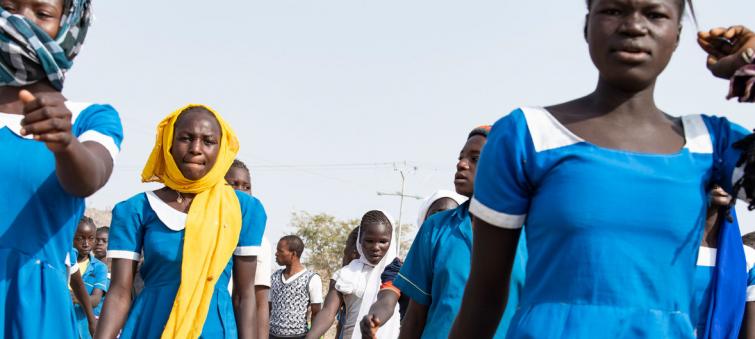
World leaders must address ‘shameful’ disparities in education spending: UN children’s agency
New York/IBNS: A new report from the UN children’s fund, UNICEF, shows that a third of adolescent girls from the poorest households have never been to school, and spending on education is heavily skewed towards wealthier households.
The study, “Addressing the learning crisis: an urgent need to better finance education for the poorest children”, was published on Monday to coincide with a meeting of education ministers, gathered at the World Economic Forum (WEF) Annual Meeting in Davos, Switzerland: the agency urged world leaders to address ‘shameful’ disparities in public education spending.
Those who do make it to school may then find themselves faced with large class sizes, poorly trained teachers,a lack of education materials and poor school infrastructure. This, says UNICEF, has an adverse impact on attendance, enrolment and learning. Excluding the poorest children from education, says the report, perpetuates poverty and is a key driver of the global learning crisis. Obstacles they face include discrimination due to gender, disability, ethnic origin, and poor infrastructure.
“Countries everywhere are failing the world’s poorest children and, in doing so, failing themselves,” said UNICEF Executive Director Henrietta Fore. “As long as public education spending is disproportionately skewed towards children from the richest households, the poorest will have little hope of escaping poverty”.
A ‘crippling learning crisis’ for poorer children
The lack of resources available for the poorest children, says the report, is exacerbating a crippling learning crisis, as schools fail to provide quality education for their students. According to the World Bank, more than half of children living in low- and middle-income countries cannot read or understand a simple story by the end of primary school.
10 countries across Africa account for the highest disparities in education spending: in Guinea and the Central African Republic – countries with some of the world’s highest rates of out-of-school children – the richest children benefit from nine and six times, respectively, the amount of public education funds than the poorest children.
Only five countries included in the study (which looked at 42 countries with available data) ensure that education is funded equally between the richest and poorest households: Barbados, Denmark, Ireland, Norway and Sweden.
The paper calls for all countries to follow this example, prioritize public funding for lower levels of education, and provide at least one year of universal pre-primary education for every child.
“We are at a critical juncture” said Ms. Fore. “If we invest wisely and equitably in children’s education, we have the best possible chance of lifting children out of poverty by empowering them with the skills they need to access opportunities, and create new ones for themselves”.
Photo caption and credit:
UN Photo/Eskinder Debebe
Young women leave school in the town of Bol in Chad after classes.
Support Our Journalism
We cannot do without you.. your contribution supports unbiased journalism
IBNS is not driven by any ism- not wokeism, not racism, not skewed secularism, not hyper right-wing or left liberal ideals, nor by any hardline religious beliefs or hyper nationalism. We want to serve you good old objective news, as they are. We do not judge or preach. We let people decide for themselves. We only try to present factual and well-sourced news.







